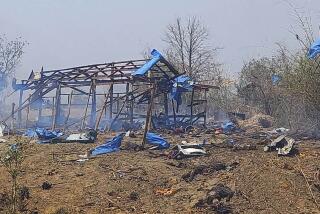Rep. Solarz Sees Rapid Change in Burma
- Share via
BANGKOK, Thailand — The embattled Burmese government has “completely lost” the confidence of its people, Rep. Stephen J. Solarz (D-N.Y.) declared here Sunday night on arrival from Rangoon, the Burmese capital.
“My basic impression is that the future of Burma is likely to be determined in the next week,” the congressman, head of the House subcommittee on Asian affairs, said after his whirlwind 24-hour visit.
“The people of Burma have already voted decisively in favor of democracy. . . . The only question now is whether the new era will emerge peacefully in accordance with the will and the wishes of the Burmese people or whether it will be the product of chaos and anarchy and violence.
“The decision lies largely in the hands of the regime itself.”
Met Top Officials
Solarz said he met with top government officials, opposition figures and student leaders on the fact-finding trip. “I did come away with the impression that the government realizes the gravity of the situation,” he told reporters at a hastily arranged press conference.
But, he said, the officials of the ruling regime he met over lunch--President Maung Maung and Prime Minister Tun Tin--gave no indication they would abandon their timetable for political change. In the face of continued protests, crippling strikes and popular demands for immediate installation of an interim nonpartisan government, Maung Maung has pressed on with plans for a Sept. 12 congress of the ruling Burma Socialist Program Party to decide on a later referendum on multiparty democracy in Burma.
Solarz said he does not believe the people will put up with the legalistic process, even if the one-party regime, which has ruled Burma since a 1962 coup by strongman Ne Win, eventually supports an open political system.
“The people believe that the referendum is unnecessary and that population has already clearly expressed through a series of demonstrations involving hundreds of thousands of Burmese that they want a multi-party democracy,” he said.
If the ruling party sticks to its timetable, the congressman suggested, the streets of Rangoon and other Burmese cities will fill again with demonstrators this week. Student leaders have called for another general strike Thursday and, according to Solarz, “in most parts of the country the civilian apparatus of the government has utterly unraveled . . . has virtually ceased to exist.”
“The credibility of the regime is somewhere between nil and negligible,” he contended.
The congressman, an outspoken critic of authoritarian regimes in Asia, said he also met with U Nu, the former prime minister who formed an opposition alliance last week; Aung Gyi, a former military ally of Ne Win who has become his sharpest critic; Aung San Suu Kyi, daughter of Burma’s independence leader Aung San, and former Defense Minister Tin Oo, a member of U Nu’s alliance.
Solarz told reporters that he did not meet with Ne Win, whom he called a “remote and unfathomable figure,” but he said that the 77-year-old former general “continues to play a decisive and important role.”
Some in Military Sympathetic
He also said that he held no talks with active-duty military officers but that briefings he received from U.S. and other officials in Rangoon suggested that most enlisted men and many junior officers are in sympathy with the demonstrators. Senior officers, he noted, are a “big imponderable” since they have enjoyed the privileges of serving the regime.
Some military units, Solarz said, would probably be prepared to take arms against the demonstrators again. When the demonstrations mounted in Rangoon in early August, soldiers fired into the crowds of unarmed protesters, killing as many as 1,000, according to most reports.
On other points, the congressman said:
-- He will introduce a resolution when Congress reconvenes Wednesday, expressing the unequivocal support of the U.S. government for the peaceful transition to a multi-party democracy in Burma.
-- Solarz called on Americans to contribute now to funds to supply medicine and other medical items to Burma; he said that once a multi-party system is established, Washington should consider stepped-up aid for economic recovery.
More to Read
Sign up for Essential California
The most important California stories and recommendations in your inbox every morning.
You may occasionally receive promotional content from the Los Angeles Times.













